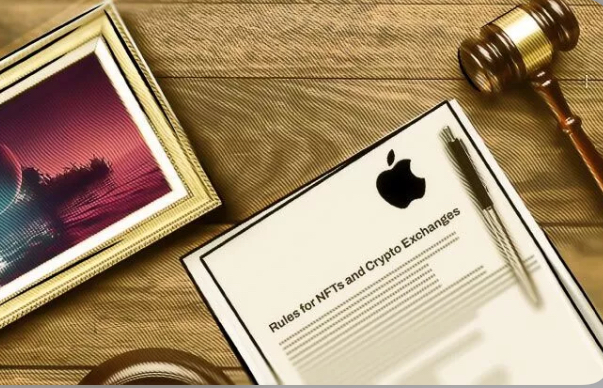Apps will be prohibited from including buttons, external links, or other calls to action.
The company has come under fire for applying its 30% commission on NFT sales made through NFT marketplace.
Apple has established explicit regulations for nonfungible tokens (NFTs) in its App Store policies regarding NFTs and cryptocurrency exchanges. The new regulations explain when a crypto exchange app may be listed and how NFT purchases will be taxed as well as what they may and may not be used for.
The language was added to the App Store standards allowing in-app purchases of NFTs but prohibiting NFTs purchased elsewhere from being used for anything other than viewing. However, the tech company appears to be doubling down on its NFT “Apple tax,” which lumps in-app NFT purchases into its standard 30% commission rate on all purchases, by requiring all NFT purchases to be made in-app.
Apps will be prohibited from including buttons, external links, or other calls to action, which could allow users to avoid app-store commissions when purchasing NFTs. The company has come under fire for applying its 30% commission on NFT sales made through NFT marketplace apps like OpenSea or Magic Eden, a move that has been labeled as “grotesquely overpriced” when compared to the typical 2.5% commissions on NFT purchases. Nevertheless, the rules have been implemented.
New Rules Remain Consistent With Apple’s Current Position
Magic Eden stated that it removed its service from the App Store after learning of the policy, and that other NFT marketplaces have reduced their application functionality to allow users to only browse and view their owned NFTs. Apple’s policies prohibit utilizing cryptocurrency for in-app purchases and only permit the use of fiat money and “valid payment methods” like debit or credit cards.
The updated rules do not alter Apple’s current stance on cryptocurrency trading applications offered by exchanges like Binance and Coinbase, where trades are exempt from the 30% Apple tax. To make it clear that cryptocurrency exchange apps can only be provided in their app in nations or locations where the app has the necessary licensing and rights to operate a cryptocurrency exchange, the new text has been added.

